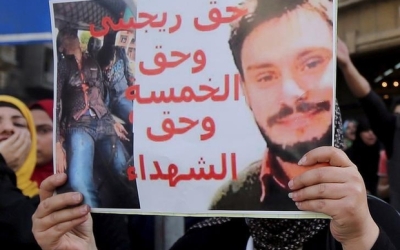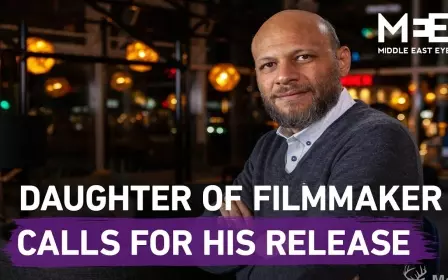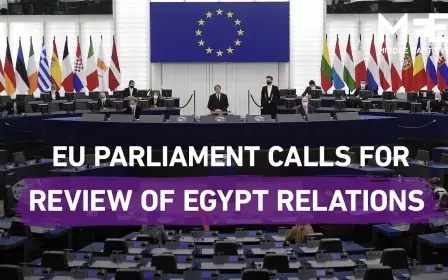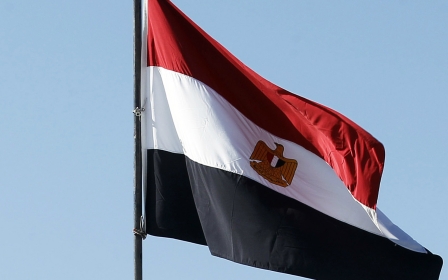Giulio Regeni murder: Egypt clears officers and slams Italian accusations
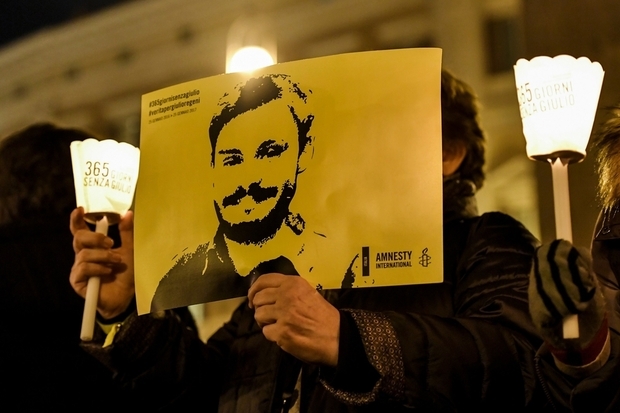
The Egyptian public prosecutor cleared security forces accused by Italian authorities of involvement in the 2016 murder of graduate student Giulio Regeni, suggesting that the killing was a plot to undermine relations between Cairo and Rome.
In a statement released on Wednesday, public prosecutor Hamada al-Sawy acknowledged that Egyptian security forces had investigated Regeni - an Italian student who was conducting research in Egypt - over "suspicious behaviour", but said the probe concluded before his death.
Regeni, who was studying with the UK's Cambridge University, went missing in Egypt in January 2016. His body was found nine days later in a ditch showing extreme signs of torture.
On Wednesday, the Egyptian prosecutor slammed the Italian charges against security officials in Egypt. "Everything presented by the Italian investigating authority against them is based on false assumptions rejected by logic and the internationally recognised rules of criminal law," he said.
Sawy said Egyptian authorities had thoroughly investigated the murder, but the perpetrators remain unknown. However, the prosecutor floated two theories about the killing.
New MEE newsletter: Jerusalem Dispatch
Sign up to get the latest insights and analysis on Israel-Palestine, alongside Turkey Unpacked and other MEE newsletters
He said members of a criminal gang who had targeted foreigners for robbery were suspected of killing Regeni, but they were killed in a shootout with Egyptian police during an attempt to apprehend them.
Sawy's second theory is more elaborate. He accused "actors hostile to Egypt and Italy" of killing Regeni and leaving his body near state institutions to frame the Egyptian government and "exploit the incident" to cause friction between the two countries.
The slain graduate student, who was 28 at the time of his death, had been speaking to street vendors and union leaders for his thesis.
The prosecutor said Regeni engaged in "unusual conduct" and spoke to his interviewees about politics.
"The investigations confirmed that the victim had spoken to street vendors about the ruling system in Egypt, stressing to them that it is in their hands to change the status quo," the statement said.
Regeni's death spiked tensions between Rome and Cairo amid reports that the student was arrested before his murder.
Italian charges
Earlier this month, Italian authorities said they plan to charge four senior Egyptian security officials with the "aggravated kidnapping" and murder of Regeni.
"We think we've collected elements of significant proof. We are going to ask to begin a criminal action concerning certain members of the Egyptian security services," Michele Prestipino, Italy’s public prosecutor, said while announcing the indictment.
"We owe it to the memory of Giulio Regeni."
Sawy's statement on Wednesday suggests that Cairo does not intend to hand over the suspects. Italian law allows trials to proceed in absentia.
Since rising to power after a 2013 military coup, Egyptian President Abdel Fattah el-Sisi has embarked on a brutal crackdown on any form of political opposition, jailing more than 60,000 dissidents.
Over the past years, rights groups have accused Egyptian authorities of enforced disappearances, torture and extrajudicial executions.
"What happened to Giulio continues to be the tragic reality for many in Egypt," Human Rights Watch said in a statement earlier this month.
"The country's badly overcrowded prisons and unofficial detention centers are filled with tens of thousands of political prisoners, often subjected to torture or other inhuman or degrading treatment.
"Basic freedoms are severely curtailed, judges rarely investigate abuses, and many of them are effectively in service of repression."
Middle East Eye delivers independent and unrivalled coverage and analysis of the Middle East, North Africa and beyond. To learn more about republishing this content and the associated fees, please fill out this form. More about MEE can be found here.


